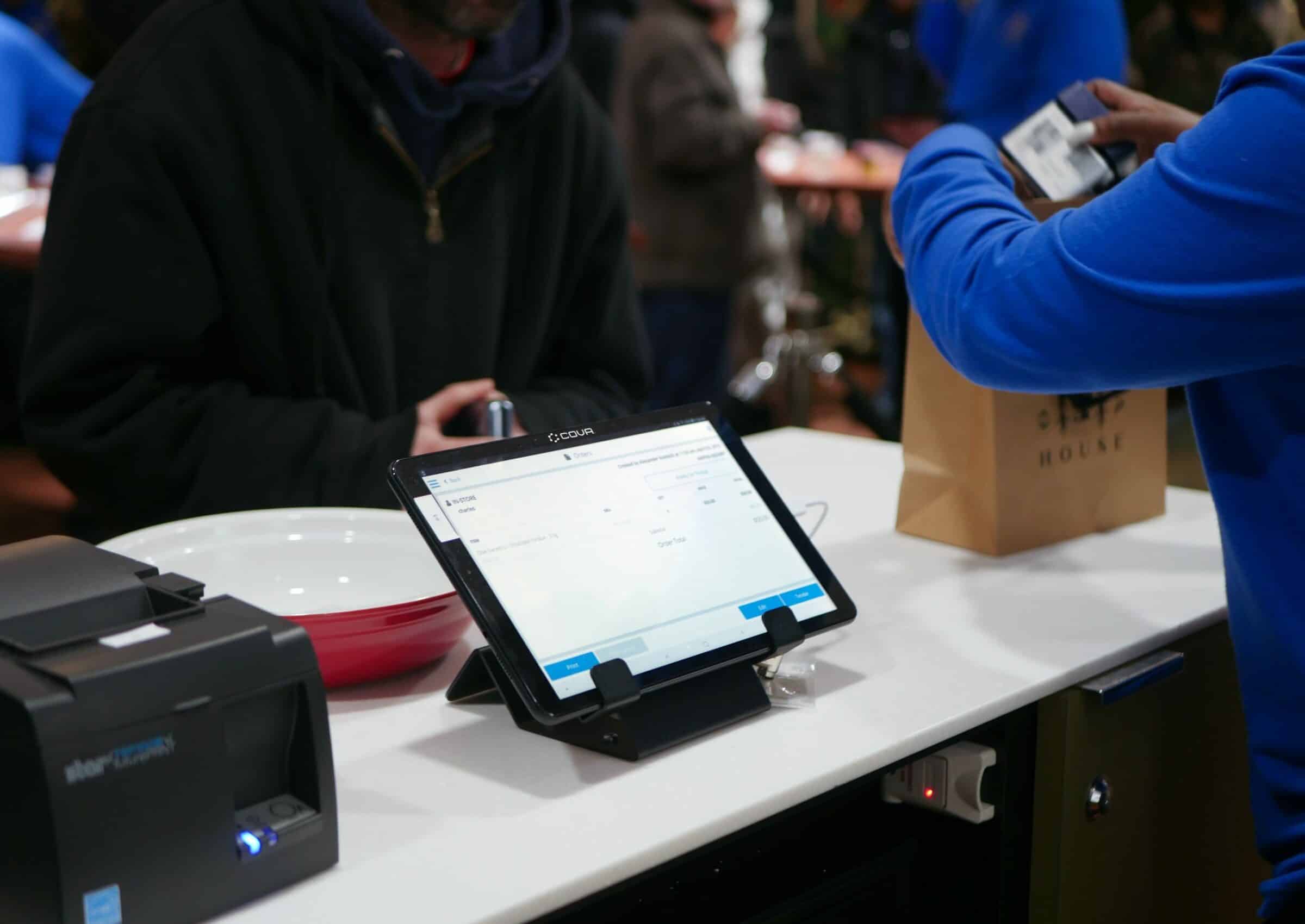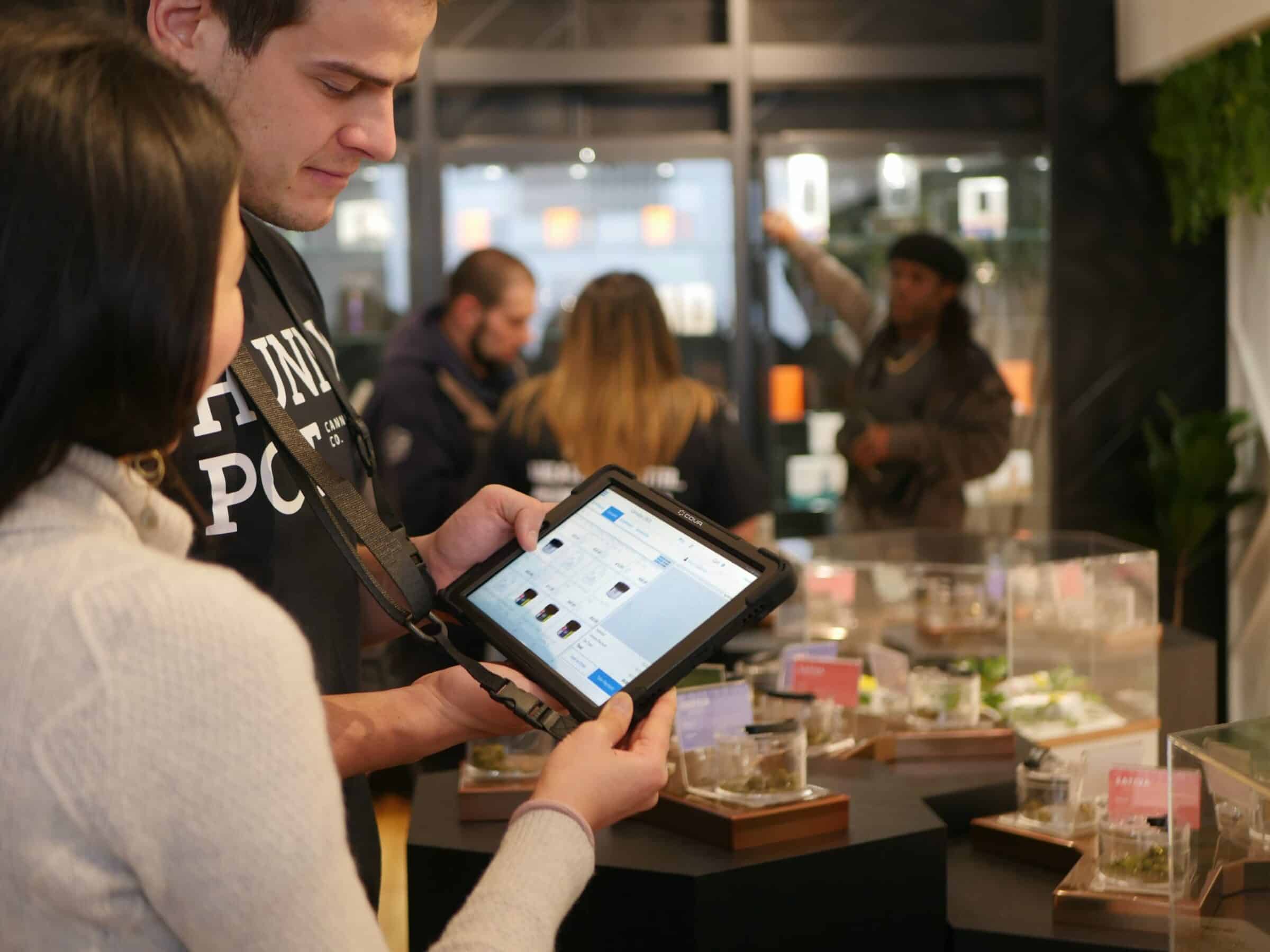Key takeaways:
- An EPOS system can massively save your business time and money by speeding up sales and queues and supplying better customer services.
- Using an EPOS system will give your company tighter stock control, helping keep a positive cash flow.
- As EPOS systems are connected to one centralised database, enabling businesses to make informed decisions based on real-time data.
What is the Difference Between EPOS and POS Systems?
An electronic point of sale (EPOS) system is a type of computerised and networked system used to record and process customer purchases at retail locations.
An EPOS system, like an electronic cash register (ECR), is a combination of hardware and software designed for the purpose of capturing financial transactions quickly and accurately.
In more advanced forms, EPOS systems can also supply more sophisticated processes for managing customers as well as any pertinent customer information.
Unlike a traditional offline POS or cash register, an EPOS system can process customer orders and payments electronically, and in more sophisticated forms also supply added customer services and options.
This allows the retailer to manage and keep track of sales in real time and use data to better understand their customers’ needs.
Retail and hospitality consumer processes are important differentiators and form part of their brand experiences.
For example, a fast-food restaurant offers a combination of services which gives consumers a choice. An example being till and payment systems, self-service kiosks, table ordering, drive-through, and online delivery websites and apps.
They all need to be fully integrated with an EPOS system to provide a cohesive and fast ordering and delivery system, financial transactions and follow-ups. This means being fully integrated with in-house systems, some third-party apps and merchant services.
The taxonomy used for point-of-sale systems creates an inevitable blurring of definitions as technologies and systems develop and become intertwined. Therefore, POS, EPOS and ECR systems can increasingly refer to ways of describing converging systems or emphasising certain characteristics.
Learn more: A Guide to POS Mobile Connectivity & IoT SIM cards
Six Key Benefits of an EPOS System
There are emerging benefits of EPOS systems, ranging from improved, speedy connectivity to a higher level of customer choice and service. Consumers increasingly like to buy their goods, services, and hospitality experiences in ways fitting to their temporal needs.
A person changes behaviours and preferences based upon being alone, with family or at work. Businesses need to cater for these adaptations as they modify buyer behaviour and their decision-making. If the service option isn’t available, they may go elsewhere.
Below are the six most important factors for using EPOS systems and how they can help retailers and hospitality providers enhance their customer services, processes and experiences:
1) Centralised database
The main benefit of an integrated EPOS system is that it supplies one centralised database that other systems can interface with.
An EPOS system will record every sale and keep a record of the data that goes with it, meaning that retailers can easily compare sales performance and analyse customer buying habits.
Graphs, charts, and reports showcase the data, allowing retailers to make informed business decisions with greater speed and accuracy.
The data is accessible anytime, anywhere – so businesses can make decisions based on exact, up-to-date information and effectively operate in real-time.
EPOS systems offer benefits when it comes to communication. Rather than relying on manual or paper-based processes, EPOS systems allow for a much smoother flow of information between staff and customers.
Because this data is usually working in tandem with cloud-based software, there is a high level of security and reliability, meaning it can be safely accessed from any internet-enabled device.
Systems use end-to-end device encryption, which can also be further tunnelled through virtual private networks (VPN) for added security. EPOS systems also need to have their software, which affects which financial transactions are approved and placed under change management control by merchant or acquirer accredited bodies.
2) Save time and money
Another major benefit of using an EPOS system is that it can massively save your business time and money.
Due to the automation of certain processes, EPOS systems can significantly reduce the amount of time and effort it takes to process sales.
For example, when customers pay with a card or contactless payment, an EPOS system can instantly process this transaction without the need for manual input.
This means less paperwork and no long queues – reducing staff costs and improving customer experience (but more on that in a little bit).
The centralised nature of an EPOS system also means that accounting and payroll processes can be quickly and easily carried out.
The ability to complete transactions faster means that you can get more from your workforce who are freed to make consumer experiences more friendly and consultative.
3) Improve efficiency and accuracy
The next great benefit of an EPOS system is that it can significantly help to improve efficiency and accuracy, especially in the retail environment.
By automating tasks such as inventory management, customer service prompts, routing, and financial reporting, an EPOS system can free up staff time for other important customer service tasks.
As all information is stored digitally in one place, it’s easy to update and access records quickly. This can help to minimise human errors and mistakes in the workplace which can negatively affect consumer and staff experiences/wellbeing and inventory/waste.
With an EPOS system in place, retailers can enjoy benefits such as real-time stock updates and automated data capture – making life much easier for both staff and customers alike.
4) Tighter stock control
Having the ability to track stock levels in real time is an asset for any retailer. An EPOS system gives businesses greater visibility of their inventory, allowing them to keep a close eye on what customers are buying and when.
If you have too much stock you’re affecting cash flow, but if you have too little stock you’ll miss out on potential sales and create negative experiences for consumers. The gap is often termed breakage.
As EPOS systems work on the same database as the company’s ERP software, stock information is up-to-date and therefore enables customer service employees to check and make more consultative decisions with consumers.
This can also help retailers predict demand, plan promotions, improve cash flow, and effectively manage stock levels more accurately without having to manually check the shelves.
EPOS systems also supply helpful insights into customer behaviour and preferences which can help management make more informed and flexible decisions. Retailers and hospitality providers can reflexively tailor their product range and points of presence accordingly.
5) Improved sales opportunities
A combination of quantitative and qualitative data lies at the heart of understanding your customers – and that’s exactly what makes EPOS systems so powerful.
By capturing customer data, an EPOS system can be used to find new sales opportunities and help in the generation of targeted campaigns.
When combined with customer and employee feedback and anecdotal evidence, they can form part of a more informed and cohesive business strategy that seeks to create customer choice and positive client and employee experiences.
The ability to track transactions in real-time also means that retailers can offer customers tailored discounts and promotions on the spot. This is important as it empowers customer facing employees and ensures that clients are involved in the process.
An EPOS system essentially acts as a ‘virtual shop assistant’ by taking away many of the manual processes. This benefits businesses in several ways, including reducing human error, streamlining processes and providing greater visibility into sales and inventory data for everyone.
Moreover, EPOS systems can be used to create loyalty programs which reward customers for their patronage, helping increase customer satisfaction and encourage repeat business.
6) Better customer service (and more customer loyalty)
Following on from our last point, utilising an EPOS system to its utmost potential can improve your company’s customer service and build customer loyalty.
When customers know they will be served quickly and efficiently, they are more likely to return time and time again.
By cutting down waiting times with automated processes, customers can get a faster, smoother experience. This cannot be overlooked, considering that some research shows UK customers will on average give up waiting after 6 minutes and 46 seconds (which can be construed as being a little too exact!).
This of course depends upon the individual, the context, and the temporal dynamics that are swirling for them. They vary considerably, and are dependent on their desire for the product or service, its scarcity, availability of competition, and the time they feel they have invested in queuing versus predicted time to completion.
An EPOS system can help to speed up the checkout process by streamlining the payment process and reducing the amount of waiting time. This benefits both customers and staff alike – freeing up employees’ time to focus on other customer-centric tasks. A good example being the tap-and-go systems that have revolutionised bus and train travel.
In addition, EPOS systems can also be used to accept multiple payment methods – meaning customers no longer must wait in line while someone counts out their change or finds their card.
A benefit of smartphone wallets being their ability to support multiple merchant cards and the habit-forming nature of secure face ID meaning they are usually prepared and ready just in advance of the transaction.
What’s more, EPOS systems can store customer information and track purchase history – giving staff the opportunity to provide more personalised service if they can access this information quickly.
This wealth of improved sales opportunities, tighter stock control, and customer benefits makes an EPOS system essential for any modern retailer.
Disadvantages of EPOS systems
While there are many things to like about EPOS systems, there are also some considerations to bear in mind:
EPOS Systems Can Be Expensive
For some businesses, the cost of an EPOS system can be an obstacle. Although there are some major benefits associated with adopting such technology, EPOS systems can cost upwards of £400 and have a wide price range dependent on features.
Many systems are more complex and require customer management platforms to be integrated. Increasingly, EPoS terminals and systems partner with platform providers to deliver more off the shelf solutions that can be easily configured and branded for retailers.
Fortunately, many providers offer their services through SaaS models which means that retailers can avoid significant up-front costs and instead pay monthly.
Another important factor is cash-flow. The time between the transaction and the cash being credited into the retailers account is critical for most businesses and especially smaller retail and hospitality providers.
Some EPoS system providers can deliver this the same working day, which is a significant benefit. Others may require much longer, which adds risk and cost for the retailer.
If you want to weigh up the return on investment (ROI) for an EPOS system, using an ROI calculator is a great way to do this.
To make sure you’re getting value for money and the best system for your business needs, it’s clearly important to research and compare different EPOS systems to find the one to suit your needs and budget.
While devices that connect to a mobile phone can be convenient for smaller retailers, they are dependent on the phone’s connectivity and charge.
Many EPoS system providers are offering highly flexible commercial terms which are bringing them into the bracket of even the smallest single-person retailers, allowing them to benefit from more resilient connectivity and sophisticated management tools.
Training may seem intimidating to some
If your staff are inexperienced with EPOS systems, there may be a slight lack of confidence when it comes to using the new technology.
However, many EPOS system providers offer training courses that can help make the transition easier for less tech-savvy employees – or you can even opt for an EPOS system that’s simple enough for all your staff to learn.
So, while the benefits of an EPOS system far outweigh its drawbacks – it’s important to consider all factors when deciding if this is suitable for your business. They do mean that you will become reliant on technology partners and systems providers, so it is worth exploring the best systems and commercial terms which ensure you are protected moving forward.
Regular maintenance
Many EPoS providers are offering a fully managed service which includes next-day terminal replacement if damaged. If this is not the type of service you have procured, or you are utilising in-house IT and maintenance services, you should also consider the cost of maintenance and any upgrade fees.
An EPOS system needs to be regularly updated and supported, so this is something you should factor into your budget when looking for an EPOS system. Of course, if signing up to the SaaS model or monthly service fees, then check that updates are included as part of the plan.
The minor inconvenience and cost of updating an EPOS system can seem small, however, when compared to the ability to ensure the business and data security of customers going forward.
Indeed, it is a requirement given the need to ensure industry compliance and resilience to fraud.
How Are EPOS Systems Improving Festivals and Events?
With most festivals and events opting for cashless wristbands as their main form of payment, EPOS systems are becoming increasingly important for the success of such events.
EPOS systems offer the ability to provide a much faster and more efficient service that can allow customers to get back to enjoying themselves.
This is not without its flaws, however. To learn more about how festivals can speed up their queues, enhance security and offer easy refunds all without struggling with connectivity issues, read our blog post!
Read more: How EPOS card machines are revolutionising payments at festivals and events
Discover IoT Solutions with Caburn Telecom
Thank you for reading our post on the benefits of EPOS systems. We hope you enjoyed it.
Overall, an EPOS system can help your business stand out from the competition by providing exceptional customer service – resulting in increased customer loyalty and higher profits.
Want to learn more about EPOS systems? Read our post on How Mobile EPOS Systems and SIM Card Connectivity Can Benefit Your Restaurant.
Caburn Telecom is an industry-leading provider of IoT (Internet of Things) devices, enabling EPOS systems to work as efficiently as possible. We have helped thousands of businesses grow and scale with our innovative technology solutions and integrated services.






